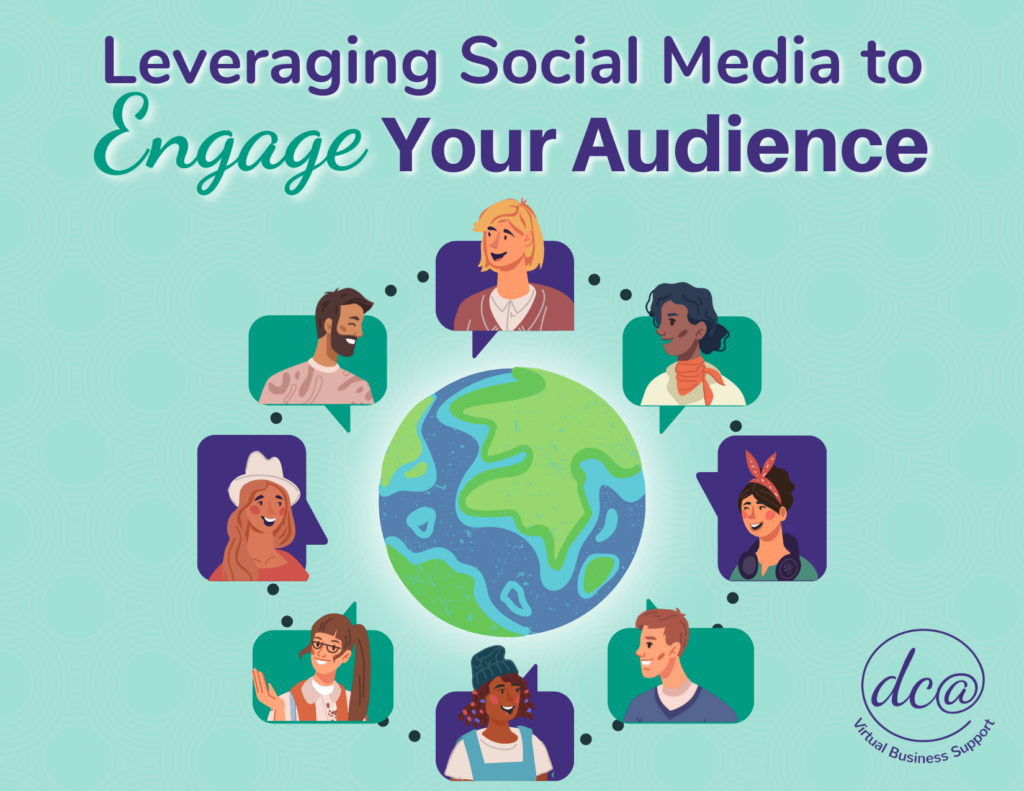
Leveraging Social Media to Engage Your Audience
Social media is no stranger to small business owners. Do you know and understand how to utilize everything it has to offer your business and its customers? The umbrella of social media is a big one, so it can be easy to overlook elements of it that could be of value to your business. No need to panic, though! We are here to unveil everything you need to take advantage of social media features such as groups, along with how to use social media as a tool to educate your audience.
Using Social Media to Educate Your Audience
Facebook Groups
If you have a personal Facebook account, chances are you are in at least one Facebook Group. But did you know that Facebook Groups can be used for more than just a virtual garage sale or neighborhood chat? Facebook Groups are designed to be used for business too!
Crystal Davis, one of our Social Media Coordinators at DCA Virtual Business Support put it this way:
“Groups are where we build communities. This is the best place for micro-communities to truly connect, engage and share information. This is where many choose to foster relationships as well. It is the perfect place to niche down.”
Facebook Groups provide great ways for you to connect with consumers, share specialized information, build a community surrounding your business, and promote products or events. Typically, Groups are more laid back and take the shape of your business persona. Though, we suggest determining the language and atmosphere surrounding the group based on your goal for the group. For example, if your goal is to gain donors, then incorporate language that garners trust while educating prospective donors about your mission. But if it is to build relationships with customers, create a space that feels less like a business meeting and more like a hang-out.
Since Facebook is a casual and personal platform, it calls for a conversational and approachable tone. People love images and videos. Audiences are much more likely to engage with content where they don’t have to read a lot and can do other things while they are learning.
Groups don’t have to just benefit your business; they can provide advantages for their members too. For those who choose to join your business’s Facebook Group, you can offer incentives like discounts, behind-the-scenes exclusives, or direct access to news and releases before they are sent out publicly. Boost your business’ reach and relationships while rewarding participants with fun, special benefits to keep them engaged with your brand.
LinkedIn Groups
You can think of LinkedIn as the dressier version of Facebook. It is a professional network used to connect with colleagues and potential clients or even employers. The tone reflects this professional nature and calls for informative and thought-provoking content relevant to the audience’s industry.
Like Facebook, LinkedIn has Groups too! They are designed to provide professionals who possess the same interests or work within the same industry with the opportunity to exchange information, ask for advice, and network with one another.
Consumers aren’t the only ones that like visually appealing and engaging content. The most effective ways to showcase educational entertainment for Facebook, LinkedIn, and any other platform you may use fall under edutainment. A mixture of entertainment with educational content.
Promoting Events & How to Select a Platform
Facebook is a more casual and personal platform and calls for a more conversational and approachable tone. LinkedIn calls for informative and thought-provoking content relevant to the audience’s industry.
Choosing a Platform.
There are five main factors to consider: your target audience, the purpose of the event, platform features, cost of promotion, and analytics. Depending on the event itself, these five factors can alter your decision greatly.
Say you are promoting an upcoming boy band concert and the band’s primary fan base is 15-25 years old. LinkedIn is probably not the most ideal platform for this promotion; however, Facebook and Instagram would be perfect for this. After all, your potential attendees are already spending their time there so why not take advantage of it? Always go where your audience is!
When to Start Promoting an Event?
Identifying the type of event and its target audience is key.
Davis shared, “A good rule of thumb is a teaser at least a month out. You then move to weekly mentions and then to daily the week before the event. You always want to consider that with the many algorithms, your posts and announcements may be missed by your target audience. So having a pinned post or even the ticket link in the bio will ensure visibility. This is also a perfect time to use your email list but with much less frequency because it is direct marketing to your brand lovers.”
In a Nutshell…
As social media continues to progress, so do the opportunities for your business. Groups are easy, free resources that you can optimize to promote your company’s events, engage with your audience, and share information about your company. If you want to start taking advantage of these tools but need a little assistance, reach out to us today. Our social media coordinators are ready to help!
